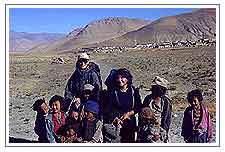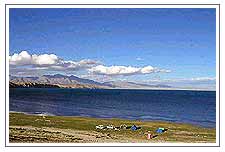
Tibet
is probably the only destination among the Himalayas that's not as known for
its adventure circuits as the rest are. But do not underestimate this
destinations as just another trans-Himalayan area of the Himalayas. There's
much more to Tibet than Buddhism, monasteries and cold desert-like weather.
Tibet's high
altitude and the atmosphere allow the sun's solar radiation to strike the
earth with unusual intensity. To protect your eyes and skin, you'd better to
bring the sunscreen, which with a sun protection factor of 15 and sunglasses
are also useful. And lip creams and balms are also sold with SPF ratings,
zinc, oxide creams provide 100% block out. Generally from April to October
is the best season for opting a Tibet tour. But it really depends on your
route and a normal winter Tibet tour schedule is quite comfortable, because
in winter, the tourist rush is not much and you can enjoy the beautiful
scenery freely.
Major Trekking Regions In Tibet
Everest Region:
Usually Everest is more known as a part of Nepal and trekkers have explored
numeorus trek routes towards this world's highest peak from Nepalese
Himalayas. Still, if you like trekking in the unexplored zones then opt the
routes to the Everest range from the Tibetan Himalayas side. One Everest
trek tour option from Tibet is from Kathmandu drive across beautiful
Nepalese countryside to the Chinese boarder town of Zangmu before
negotiating the road up through the deep gorges of Sunkoshi River to Tingri.
Trek past the ancient village of Tingri to the base camp from where one can
see the magnificent and huge dimensions of Mt. Everest.
Kailash
Mansarovar Yatra:

For
well over a thousand years, pilgrims have journeyed Kailash Mansarovar to
pay homage to the mountain's mystery, circumambulating it is a ancient
ritual of devotion that continues to this day. People have been visiting
Kailash - Mansarovar for centuries. Almost all the major passes of
Uttaranchal Himalayas lead to Kailash - Mansarovar. The important ones in
the Kumaon region are Lipulekh, Lampiya Dhura, Nuwe Dhura, Lowe Dhura, Unta
Dhura, Jayanti and Kungri Bingri. Under the administration of the Indian
ministry of external affairs and with the cooperation of the Chinese
government, Kumaon Mandal Vikas Nigam has been conducting trips to Kailash -
Mansarovar through the Lipulekh pass.
Namchag Barwa
Trek:
Namchag Barwa is an excellent short trek for nature lovers and amateur
botanists. It includes the delightful Nyima La and the lushly forested Rong
Valley. The route begins in Pei, a small village that is also the staging
post of treks to the great bend of the Tsangpo via Pelma Kochung and to
Metog. Here a ferry crosses to Timpe on the north bank of the river, site of
a revered Guru Rinpoche cave and monastery.
A splendid trail leads north to the Nyima La through some of the finest
virgin forests and flower gardens in southeastern Tibet. The idyllic walk
passes a nomad camp and groves of flowering rhododendrons along the way.
Many plant species abound on the open moorlands near the pass. From the pass
there are tremendous views of the Assam Himalayas, including nearby Gyala
Pelri and Namche Barwa. On the far side of the Nyima La is the Rong Valley,
a heavily forested scenic valley that is luxuriantly carpeted with primulas
and violet irises from May to July. The best time for this trek is from May
to October.
Trekking Permits In Tibet
There are two requirements for foreign tourists tour in Tibet. One is the
Chinese Visa, which you can apply for in Chinese Embassy in your place.
Another is the Alien' Travel Permit, which issued by Tibet Tourism Bureau.
There are no independent trek tours allowed in Tibet. You should join an
organized group or have the local travel operator arrange a trek tour for
you.
High Altitude Sickness
High Altitude Sickness could happen to any
guest in high altitude. The effect of HAS usually remains 2 days till the
body acclimatizes. Headache, nausea, vomiting and short breath are the
common symptoms. To avoid HAS take garlic soup, more water frequently.
Diamox tabs are also recommended.


 Tibet
is probably the only destination among the Himalayas that's not as known for
its adventure circuits as the rest are. But do not underestimate this
destinations as just another trans-Himalayan area of the Himalayas. There's
much more to Tibet than Buddhism, monasteries and cold desert-like weather.
Tibet
is probably the only destination among the Himalayas that's not as known for
its adventure circuits as the rest are. But do not underestimate this
destinations as just another trans-Himalayan area of the Himalayas. There's
much more to Tibet than Buddhism, monasteries and cold desert-like weather.
 For
well over a thousand years, pilgrims have journeyed Kailash Mansarovar to
pay homage to the mountain's mystery, circumambulating it is a ancient
ritual of devotion that continues to this day. People have been visiting
Kailash - Mansarovar for centuries. Almost all the major passes of
Uttaranchal Himalayas lead to Kailash - Mansarovar. The important ones in
the Kumaon region are Lipulekh, Lampiya Dhura, Nuwe Dhura, Lowe Dhura, Unta
Dhura, Jayanti and Kungri Bingri. Under the administration of the Indian
ministry of external affairs and with the cooperation of the Chinese
government, Kumaon Mandal Vikas Nigam has been conducting trips to Kailash -
Mansarovar through the Lipulekh pass.
For
well over a thousand years, pilgrims have journeyed Kailash Mansarovar to
pay homage to the mountain's mystery, circumambulating it is a ancient
ritual of devotion that continues to this day. People have been visiting
Kailash - Mansarovar for centuries. Almost all the major passes of
Uttaranchal Himalayas lead to Kailash - Mansarovar. The important ones in
the Kumaon region are Lipulekh, Lampiya Dhura, Nuwe Dhura, Lowe Dhura, Unta
Dhura, Jayanti and Kungri Bingri. Under the administration of the Indian
ministry of external affairs and with the cooperation of the Chinese
government, Kumaon Mandal Vikas Nigam has been conducting trips to Kailash -
Mansarovar through the Lipulekh pass.